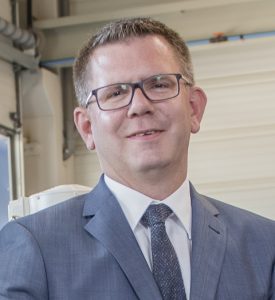 Frankfurt, 13 September 2019 – Interview with Arne Festerling, Sales Manager at ENTEX Rust & Mischke GmbH
Frankfurt, 13 September 2019 – Interview with Arne Festerling, Sales Manager at ENTEX Rust & Mischke GmbH
Within the framework of circular economy scheme promoted by the EU, the amount of recyclates to be processed should be distinctly increased. Is there a need for your machines to be technically adapted?
Arne Festerling: Our machines have been processing recyclates for decades. So, we do not have to adjust them to circular economy and the expected greater recyclate amounts. They can already do that.
Which role does the quality of recyclates play in terms of processing?
Festerling: It naturally has an impact on the result. If we feed bad material into the extruder, we cannot work Miracles. But we can process these materials very well. If you take film manufacture, for example, recylcates from edge strips or pre-production material can be very well included.
Do your customers show increasing interest in using recyclates?
Festerling: Yes. Meanwhile faced with the bad image of plastics, our customers are increasingly considering the possibility of using recyclates. There is a perceptible trend. But there is an even stronger demand for processing
biomaterials. More and more customers want to use our machines to manufacture biopolymers, which are thermally very sensitive. Our planetary roller extruder has the advantage of controlling the temperature very well. The share of bio-based plastics we have to process has meanwhile reached almost 50%. This development started about five years ago and has gained in dynamism over the past two years.
Does this demand concern bio-based or biodegradable plastics?
Festerling: We can process both. For example, wood polymer composites, WPC, which are also used as decking boards or facade cladding. They are made of wood flour and polyethylene. Our machines process WPC consisting of 80% wood flour and only 20 per cent polyethylene. The wood flour is waste from sawmills. That means you can make a product as good as new from waste and save hardwood. Wood polymer composites are also good for The climate as the more you use the more trees you save. And the trees can then help improve the CO2 balance.
Can this material be recycled?
Festerling: For WPC, we already have a kind of functioning circular economy. When a building is demolished, for example, the WPC boards are returned to the facade manufacturer. They are shredded and afterwards included into new products which are sold again. Or decking boards. They are outside on your terrace for, let’s say 20 years and then you use them to make new ones. Recently, China has introduced collection systems in 46 cities, just like that.
Can the country act as a role model?
Festerling: You can always observe how quickly developments are pushed ahead in China. Here in Europe it often takes ages. I think there is no way around a market with 1.4 billion people if you want to find solutions to global challenges. That is why we are trying more strongly to enter the Chinese market. With techniques we have not applied there previously.
But the Chinese are currently catching up in the field of machine technology, aren’t they?
Festerling: In China, we can sell machines for sophisticated applications. This is where we already have an edge. We invest a lot in research and development to maintain this position. Of course, there are competitors in China, but none that have a system like our planetary roller extruder. In China, we are meanwhile more strongly involved in process development, and apart from the classical PVC market, which used to be our focus market in China, we
are becoming increasingly active in other markets such as recycling or the food sector.
Many companies from the world of plastics complain that the bad image discourages skilled workers. Do you also have the feeling?
Festerling: We experience the opposite. People see what we are doing to solve the waste problem. This makes us an attractive employer. For instance, we put much effort in recycling of scrap tyres. When treating rubber, you apply a process called vulcanising. We reverse this process in our machines so that the material can be used like new rubber. If you communicate this properly, we will be perceived as an enterprise that deals with the issues that are problems from the viewpoint of society.
The last article from VDMA about Circular Economy was published at: Alliance to End Plastic Waste Focuses On Restructuring In Southeast Asia












